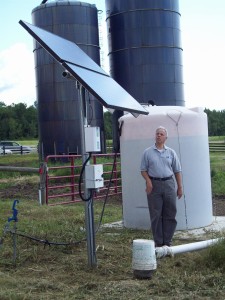Sustainable Farm Energy: 2014 Virtual Tours
 Are you looking to stabilize rising fuel and energy costs on your farm or homestead? Are you seeking more sustainable sources of energy? In this upcoming four-part webinar series, you’ll meet an organic vegetable farmer, grape grower & winemaker, sunflower & biodiesel producer, and pastured livestock farmer who will lead you through a virtual tour of their sustainable farm energy systems and ecological production techniques.
Are you looking to stabilize rising fuel and energy costs on your farm or homestead? Are you seeking more sustainable sources of energy? In this upcoming four-part webinar series, you’ll meet an organic vegetable farmer, grape grower & winemaker, sunflower & biodiesel producer, and pastured livestock farmer who will lead you through a virtual tour of their sustainable farm energy systems and ecological production techniques.
This lunchtime webinar series will run from noon-1:00pm every Friday from April 4th through April 25th. All of the webinars are free and open to the public. Registration is required. Upon registering, you’ll receive an email providing a link and instructions for you to access the series.
This webinar series is sponsored by NE SARE (Northeast Sustainable Ag Research and Education) and the Cornell Small Farms Program. Please send inquiries to smallfarmsprogram@cornell.edu. To learn about funding opportunities available from NE SARE, visit www.nesare.org. To learn more about small farm resources and support, visit www.smallfarms.cornell.edu.
April 4th: Organic Vegetable Farm Cools with the Earth: Warms with the Sun
Noon – 1:00pm with Jay Armour of Four Winds Farm, Gardiner, NY
Is it possible to operate a 24 acre diversified vegetable farm with minimal energy use? Yes! Jay Armour will take us on a virtual tour of his passive-solar heated and earth-cooled straw-bale vegetable barn with attached greenhouse. At one end of the barn are two root cellars built into a hillside that store root crops throughout the winter with minimal energy use. A 14-kw grid-intertied PV electric system is situated on the barn roof, which is being financed by a combination of a NYSERDA grant and a low-interest loan. A permanent raised bed system in the vegetable garden requires very little tractor time and hence very minimal fuel use. The Armours also transport vegetables to market in a diesel van converted to run on waste vegetable oil (WVO). The farm raises produce, heirloom seedlings, grass-fed beef, pasture raised turkeys, and intermittently pasture-raised pork. Register Here | Visit Farm Website
April 11th: Family Vineyard Shrinks Carbon Footprint by 40%
Noon – 1:00pm with Art Hunt of Hunt Country Vineyards, Branchport, NY
Since 2007, Hunt Country Vineyards has reduced total energy costs on their vineyard by 30% and their carbon footprint by more than 40%. How have they gone about it? Art Hunt will lead us on a virtual tour of their energy efficient winery, newly insulated warehouse, geothermal heating and cooling system, and vertical wind turbine. In 2012 the Hunts launched a Locavore Room which celebrates the bounty of local foods and beverages in the Finger Lakes. The Hunts are proud to say that all food & beverage items (other than wine) they offer for sale on the farm travel an average Distance-from-Source (DfS) of just 162 miles. Art will also share a variety of ecological production techniques. For example, in 2005, the Hunt family began mixing grape pomace with animal manure and then composting the mix before applying it to the vineyard. The compost adds vital minerals and nutrients to the soil that help produce outstanding grapes for winemaking and reduce the use of other fertilizers. Register Here | Visit Farm Website
April 18th: Sunflowers & Canola to Fuel: Dairy Becomes Biodiesel Production Facility
Noon – 1:00pm with Roger Rainville of Borderview Farm, Alburgh, Vermont
Interested in making biodiesel on your farm or in cooperation with other farmers? Roger Rainville will take us on a virtual tour of his former dairy-turned-energy farm in Alburgh, Vermont. In 2008, when diesel prices rose from $4 to $5 per gallon, Roger began planting sunflowers and canola on a portion of his 214 acres and installing biodiesel processing equipment. He harvests the oilseed with a combine, and uses a seed cleaner and grain dryer to prepare the seed for storage in a 60-ton grain bin prior to processing. He’ll show us how he presses the seed to get two products: oil for biodiesel and pelletized meal for feed or to burn in a pellet stove. He then sends the oil through a BioPro 190 automated biodiesel processor which can process 100 gallons of oil to fuel per day. Learn more about his equipment and the seed to fuel process by tuning in to this video. Cosponsored by the Vermont Bioenergy Initiative. Register Here | Visit the VBI Website
April 25th: Thirsty Livestock? Use Sun or Wind to Power a Remote Watering System
Noon – 1:00pm with Jonathan Barter of Barter Farm, Branchport NY
Are you getting tired of hauling water to livestock in remote pastures? Jonathan Barter will show us the renewable energy powered watering system on his 210 acre livestock farm (40 Angus cattle and 130 Cheviot and Dorset sheep). In 2010, Jonathan installed a combination wind and solar pumping system which supplies water to 58 acres of pasture. The pumping system consists of a 350 watt turbine, 400 watt solar panels, back up batteries and a deep well pump. Partial funding for this project was provided by USDA – Natural Resources Conservation Service’s Conservation Innovative Grants program. Register Here





